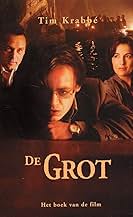Ajouter une intrigue dans votre languePsychological thriller. Geography teacher smuggles a case of heroin for a friend.Psychological thriller. Geography teacher smuggles a case of heroin for a friend.Psychological thriller. Geography teacher smuggles a case of heroin for a friend.
- Prix
- 1 victoire et 1 nomination au total
Photos
Gene Bervoets
- Man hotel
- (as Gène Bervoets)
Thomas Wander
- Vriend Egon
- (as Thomas Oerlemans)
Histoire
Le saviez-vous
- AnecdotesOriginally the movie was going to be directed by Dominique Deruddere, but he pulled out. While preparing his cinema debut AmnesiA (2001), Martin Koolhoven agreed to direct this movie, on the condition he could start anew with casting and pick his own crew. He started to rework the script with writer Tim Krabbé, but years later he said he actually didn't have enough time to get the script perfect. He said he overestimated himself.
- ConnexionsReferences AmnesiA (2001)
- Bandes originalesI Chase The Devil
Written and composed by Lee 'Scratch' Perry and Max Romeo
Published by Polygram/Universal
Performed by Max Romeo & The Upsetters
From the album "War Ina Babylon"
Commentaire en vedette
Tim Krabbe is the praised author of 'Het Gouden Ei', a novel that was put on the screen twice ('Spoorloos' and 'The Vanishing'). One of the Dutch writer's more recent works is 'De Grot', a psychological thriller about two totally different men, Egon and Axel, who meet at a youth camp and, surprising enough, become friends for dear life. Egon is a quiet, somewhat dull person, who spends his time studying and writing geography books. Axel, on the other hand, is a charismatic 'party-animal', a heavy drinking criminal whose everyday's concern is to get a woman into his bedroom. From the moment they meet, Axel has a strong influence on Egon, while the latter envies him because he has a good life without really doing anything (such as reading thick books like Egon); ultimately, Egon is even dragged by Egon into illegal practices himself, which leads to a fatal drug transport in a distant Asian country.
After having read the book last year, I was surprised the critics were quite positive about it. In my opinion, the book suffers especially from the complex structure. While Krabbe presents the story as an absorbing portrait of an uncommon relationship between two people, the plot becomes more of a puzzle: the many episodes are not presented chronologically, so that two successive scenes are seldom in the same episode. Because of this, the story feels surprisingly remote: you often need to know a character's background to really care for him or her. Another complaint was the fact that the main characters, Egon and Axel, are a little stereotypical. Egon IS 'the' dull intellectual, while Axel IS his exact opposite. In real life, such one-dimensional people rarely exist; in books and films, they always seem to be there, taking away a lot of credibility.
Despite all this, the film was a pleasant surprise, being much better than the book. The adaptation excels in its beautiful cinematography, humour and acting: Fedja van Huet (Egon) is one of the few Dutch actors who can make you forget he IS acting (which is, in my opinion, the highest an actor can achieve). The drawbacks of the film, however, are the same as the book's: mainly because the characters are one-dimensional, they are so predictable that it becomes annoying. Guess who wrote the script? Indeed, Krabbe himself. It is obvious that this talented director (that's what the movie makes clear anyway) is hampered by a deficient screenplay. Perhaps Koolhoven should just have chosen a better book.
7/10
After having read the book last year, I was surprised the critics were quite positive about it. In my opinion, the book suffers especially from the complex structure. While Krabbe presents the story as an absorbing portrait of an uncommon relationship between two people, the plot becomes more of a puzzle: the many episodes are not presented chronologically, so that two successive scenes are seldom in the same episode. Because of this, the story feels surprisingly remote: you often need to know a character's background to really care for him or her. Another complaint was the fact that the main characters, Egon and Axel, are a little stereotypical. Egon IS 'the' dull intellectual, while Axel IS his exact opposite. In real life, such one-dimensional people rarely exist; in books and films, they always seem to be there, taking away a lot of credibility.
Despite all this, the film was a pleasant surprise, being much better than the book. The adaptation excels in its beautiful cinematography, humour and acting: Fedja van Huet (Egon) is one of the few Dutch actors who can make you forget he IS acting (which is, in my opinion, the highest an actor can achieve). The drawbacks of the film, however, are the same as the book's: mainly because the characters are one-dimensional, they are so predictable that it becomes annoying. Guess who wrote the script? Indeed, Krabbe himself. It is obvious that this talented director (that's what the movie makes clear anyway) is hampered by a deficient screenplay. Perhaps Koolhoven should just have chosen a better book.
7/10
- steenvreter29
- 27 sept. 2001
- Lien permanent
Meilleurs choix
Connectez-vous pour évaluer et surveiller les recommandations personnalisées
Détails
- Date de sortie
- Pays d’origine
- Sites officiels
- Langues
- Aussi connu sous le nom de
- The Cave
- Lieux de tournage
- société de production
- Consultez plus de crédits d'entreprise sur IMDbPro
Box-office
- Brut – à l'échelle mondiale
- 70 797 $ US
- Durée1 heure 30 minutes
- Couleur
- Mixage
- Rapport de forme
- 1.85 : 1
Contribuer à cette page
Suggérer une modification ou ajouter du contenu manquant



























